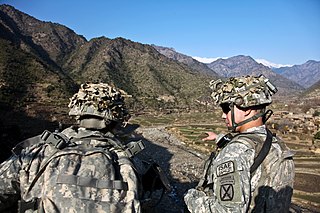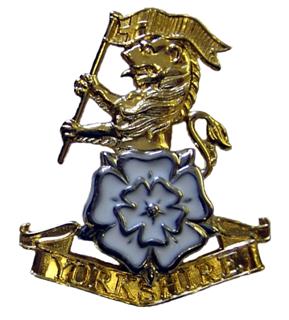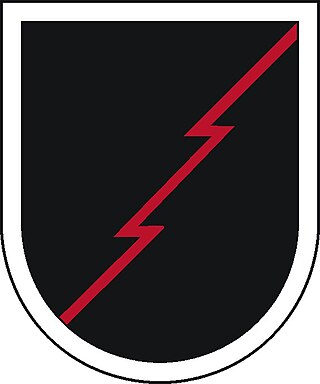
Afghanistan, officially the Islamic Emirate of Afghanistan, is a landlocked country located at the crossroads of Central Asia and South Asia. Referred to as the Heart of Asia, it is bordered by Pakistan to the east and south, Iran to the west, Turkmenistan to the northwest, Uzbekistan to the north, Tajikistan to the northeast, and China to the northeast and east. Occupying 652,864 square kilometres (252,072 sq mi) of land, the country is predominantly mountainous with plains in the north and the southwest, which are separated by the Hindu Kush mountain range. Kabul is the country's largest city and serves as its capital. As of 2021, Afghanistan's population is 40.2 million, composed of ethnic Pashtuns, Tajiks, Hazaras, Uzbeks, Turkmens, Qizilbash, Aimak, Pashayi, Baloch, Pamiris, Nuristanis, and others.

Operation Enduring Freedom (OEF) was the official name used synonymously by the U.S. government for both the War in Afghanistan (2001–2021) and the larger-scale Global War on Terrorism. On 7 October 2001, in response to the September 11 attacks, President George W. Bush announced that airstrikes targeting Al-Qaeda and the Taliban had begun in Afghanistan. Operation Enduring Freedom primarily refers to the War in Afghanistan, but it was also affiliated with counterterrorism operations in other countries, such as OEFnced the end of Operation Enduring Freedom in Afghanistan. Subsequent operations in Afghanistan by the United States' military forces, both non-combat and combat, occurred under the name Operation Freedom's Sentinel.

The Taliban, which also refers to itself by its state name, the Islamic Emirate of Afghanistan, is a Deobandi Islamic fundamentalist and Pashtun nationalist militant political movement in Afghanistan. It ruled approximately three-quarters of the country from 1996 to 2001, before being overthrown following the United States invasion. It recaptured Kabul on 15 August 2021 after nearly 20 years of insurgency, and currently controls all of the country, although its government has not yet been recognized by any country. The Taliban government has been criticized for restricting human rights in Afghanistan, including the right of women and girls to work and to have an education.

Hamid Karzai is an Afghan statesman who served as the fourth president of Afghanistan from July 2002 to September 2014, including as the first elected president of the Islamic Republic of Afghanistan from December 2004 to September 2014. He previously served as Chairman of the Afghan Interim Administration from December 2001 to July 2002. He is the chief (khān) of the Popalzai Durrani tribe of Pashtuns in Kandahar Province.

The International Security Assistance Force (ISAF) was a multinational military mission in Afghanistan from 2001 to 2014. It was established by United Nations Security Council Resolution 1386 pursuant to the Bonn Agreement, which outlined the establishment of a permanent Afghan government following the U.S. invasion in October 2001. ISAF's primary goal was to train the Afghan National Security Forces (ANSF) and assist Afghanistan in rebuilding key government institutions; it gradually took part in the broader war in Afghanistan against the Taliban insurgency.

The Australian contribution to the war in Afghanistan has been known as Operation Slipper (2001–2014) and Operation Highroad (2015-2021).

As of 4 September 2006, there have been 3,502 coalition deaths in Afghanistan as part of ongoing coalition operations since the invasion in 2001. In this total, the American figure is for deaths "In and Around Afghanistan" which, as defined by the United States Department of Defense, includes some deaths in Pakistan and Uzbekistan and the deaths of 18 CIA operatives.

The Royal Yorkshire Regiment is an infantry regiment of the British Army, created by the amalgamation of three historic regiments in 2006. It lost one battalion as part of the Army 2020 defence review. The regiment's recruitment area covers the ceremonial counties of the East Riding of Yorkshire, North Yorkshire, South Yorkshire and West Yorkshire; areas near Barnsley are recruitment area for the Rifles.
War in Afghanistan, Afghan war, or Afghan civil war may refer to:
Canada's role in the Afghanistan War began in late 2001. Canada sent its first element of soldiers secretly in October 2001 from Joint Task Force 2, and the first contingents of regular Canadian Armed Forces (CAF) troops arrived in Afghanistan in January–February 2002. The operations were aimed at identifying and neutralizing Al-Qaeda members in that country and toppling the Taliban regime which was supporting international terrorism. Canada's role in the Afghan conflict grew in 2006 when Canadian troops relieved US forces in Kandahar province, taking command of the multinational brigade in the region during a major Taliban offensive.
Battle of Kabul may refer to:

The Battle of Tora Bora was a military engagement that took place in the cave complex of Tora Bora, eastern Afghanistan, from November 30 – December 17, 2001, during the final stages of the United States invasion of Afghanistan. It was launched by the United States and its allies with the objective to capture or kill Osama bin Laden, the founder and leader of the militant organization al-Qaeda. Al-Qaeda and bin Laden were suspected of being responsible for the September 11 attacks three months prior. Tora Bora is located in the Spīn Ghar mountain range near the Khyber Pass. The U.S. stated that al-Qaeda had its headquarters there and that it was bin Laden's location at the time.

The American invastion of Afgahaistan started in 2001 and ended in 2021. It started because of the 9/11 attacks conducted by Al-Qaeda. The war in Afghanistan was America's longest war.

The war on terror, officially the Global War on Terrorism (GWOT), is an ongoing global counterterrorism military campaign initiated by the United States following the September 11 attacks and is also the most recent global conflict spanning multiple wars. The main targets of the campaign were militant Islamist and Salafi jihadist armed organisations such as Al-Qaeda, the Islamic State, and their international affiliates, which were waging military insurgencies to overthrow governments of various Muslim-majority countries. Other major targets included the Ba'athist regime in Iraq, which was toppled during an invasion in 2003, and various militant factions that fought during the ensuing Iraqi insurgency.

The War in Afghanistan was an armed conflict from 2001 to 2021. It began when an international military coalition led by the United States launched an invasion of Afghanistan, toppling the Taliban-ruled Islamic Emirate and establishing the internationally recognized Islamic Republic three years later. The conflict ultimately ended with the 2021 Taliban offensive, which overthrew the Islamic Republic, and re-established the Islamic Emirate. It was the longest war in the military history of the United States, surpassing the length of the Vietnam War (1955–1975) by approximately 6 months.
There were 2,402 United States military deaths in the War in Afghanistan (2001–2021). 1,921 of these deaths were the result of hostile action. 20,713 American servicemembers were also wounded in action during the war. In addition, 18 Central Intelligence Agency (CIA) operatives also died in Afghanistan. Further, there were 1,822 civilian contractor fatalities.

The 274th Forward Surgical Team (Airborne)—part of the 274th Forward Resuscitative and Surgical Detachment (Airborne)—is an airborne forward surgical team of the United States Army providing Level II care far forward on the battlefield. It was first constituted in 1944 and served in Europe during World War II. More recently it has been involved in relief operations following natural disasters and has undertaken several recent deployments to Iraq and Afghanistan. The 274th Forward Surgical Team was part of both the initial entry forces of Operation Enduring Freedom in 2001 and Operation Iraqi Freedom in 2003. Currently the unit falls under the command of the 28th Combat Support Hospital and is based at Fort Bragg, North Carolina.

The Islamic Republic of Afghanistan was a presidential republic that ruled Afghanistan from 2004 to 2021. The state was established to replace the Afghan interim (2001–2002) and transitional (2002–2004) administrations, which were formed after the 2001 United States invasion of Afghanistan that had toppled the partially recognized Taliban-ruled Islamic Emirate of Afghanistan. However, on 15 August 2021, the country was recaptured by the Taliban, which marked the end of the 2001–2021 war, the longest war in US history. This led to the overthrow of the Islamic Republic, led by President Ashraf Ghani, and the reinstatement of the Islamic Emirate under the control of the Taliban. The United Nations still recognizes the Islamic Republic as the legitimate government of Afghanistan instead of the Islamic Emirate, the de facto ruling government. The US–Taliban deal, signed on 29 February 2020 in Qatar, was one of the critical events that caused the collapse of the Afghan National Security Forces (ANSF). Following the deal, the US dramatically reduced the number of air attacks and deprived the ANSF of a critical edge in fighting the Taliban insurgency, leading to the Taliban takeover of Kabul.










